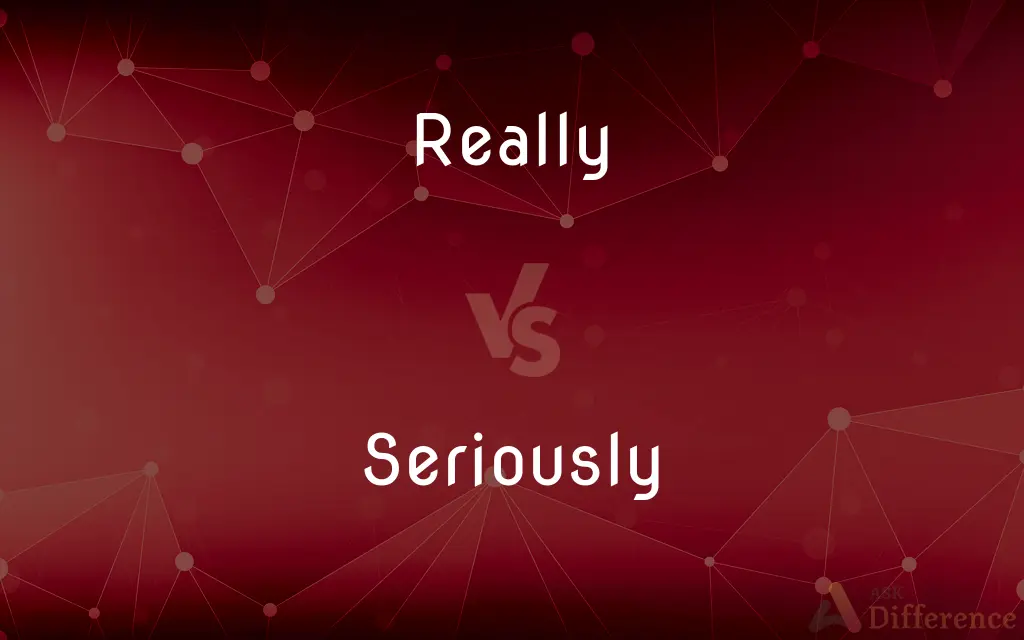Really vs. Seriously — What's the Difference?
By Maham Liaqat & Urooj Arif — Updated on April 22, 2024
"Really" emphasizes truth or surprise, enhancing a statement's intensity, while "seriously" stresses earnestness or lack of humor in discussions.

Difference Between Really and Seriously
Table of Contents
ADVERTISEMENT
Key Differences
"Really" is commonly used to express genuine surprise or to confirm the truthfulness of a statement. It can enhance the speaker’s emotions or reactions, suggesting a deeper level of engagement with the conversation. On the other hand, "seriously" often conveys a tone of solemnity or urgency, indicating that the subject matter should be regarded with earnestness or considered carefully.
When used as a question, "Really?" can signify disbelief or request confirmation, showing curiosity or skepticism about the information presented. Conversely, "Seriously?" implies that the speaker is questioning the sensibility or appropriateness of the action or statement, often with a subtle hint of disapproval or concern.
In informal settings, "really" can serve as a versatile intensifier, making a description more vivid or emotional. For instance, saying "I'm really happy" conveys a stronger feeling of happiness. In contrast, "seriously" in informal contexts might be used to stress the importance or unexpected nature of an event, as in "He seriously went there alone?"
The use of "really" can soften a statement, making it seem less direct or confrontational, which can be strategic in sensitive conversations. Meanwhile, using "seriously" can have the opposite effect, heightening the gravity of the discourse and possibly leading to more intense exchanges.
In rhetorical or sarcastic remarks, "really" can underscore the speaker's incredulity or mock surprise, adding a layer of irony to the statement. Whereas, "seriously" used rhetorically enhances the critical tone, often challenging the logic or reasonableness of the preceding content.
ADVERTISEMENT
Comparison Chart
Primary Use
Intensifier or to express surprise
To express earnestness or urgency
Tone
Can be light or skeptical
Generally more serious or urgent
Common Contexts
Casual conversations, affirmations
Serious discussions, warnings
Emotional Weight
Varies; often lighter
Heavier, with a sense of importance
Example Usage
"Are you really going to eat that?"
"Are you seriously considering it?"
Compare with Definitions
Really
As an intensifier for adjectives and other adverbs.
She is really beautiful.
Seriously
In questions to express disbelief or shock.
Seriously? He did that?
Really
As an adverb, used to emphasize the truth.
Really, I didn’t know that.
Seriously
To emphasize the truth in a grave manner.
I am seriously worried about him.
Really
In sarcastic contexts to express irony.
Oh, really? That’s so surprising!
Seriously
To indicate that something is not humorous or light-hearted.
Take this seriously.
Really
To affirm something sincerely.
I really appreciate your help.
Seriously
As a warning or caution.
Seriously, watch out for that.
Really
To express surprise or disbelief.
Really? When did that happen?
Seriously
As an adverb to state something with earnestness.
Seriously, I considered all options.
Really
In actual truth or fact
There isn't really a lake there.
It's just a mirage.
Seriously
Thoughtful, somber, or grave in manner
He became serious when he was asked about the economy.
Really
To a great degree; very much
I would really like to meet your sister.
Seriously
Not joking or trifling
I was serious when I said I liked your haircut.
Really
Very; utterly
That was a really enjoyable evening.
Seriously
Deeply interested or involved
A serious golfer.
Really
Without a doubt; indeed
Really, I don't want more dessert.
Seriously
Meriting great concern
A serious illness.
A serious mistake.
Really
Used to express surprise, skepticism, displeasure, or interest
"I've been reading her diary." "Really?".
Seriously
Performed with careful thought
A serious effort to reform tax policy.
Really
(literal) In a way or manner that is real, not unreal.
Seriously
Pertaining to important rather than trivial matters
A serious discussion.
Really
(modal) Actually; in fact; in reality.
"He really is a true friend." / "Really? What makes you so sure?"
Seriously
Sincerely meant
Mistook a sarcastic comment for a serious question.
Really
Very (modifying an adjective); very much (modifying a verb).
But ma, I really, really want to go to the show!
Seriously
Intended for sophisticated people
Serious music.
Really
Indicating surprise at, or requesting confirmation of, some new information; to express skepticism.
A: He won the Nobel Prize yesterday.
B: Really?
Seriously
(Informal) Of considerable size or scope; substantial
A serious amount of money.
Really
Indicating that what was just said was obvious and unnecessary; contrived incredulity
A: I've just been reading Shakespeare - he's one of the best authors like, ever!
B: Really.
Seriously
(manner) In a serious or literal manner.
He was hoping that we would take him seriously.
Jimmy jokingly called Bob a doofus. Bob took the insult seriously.
Really
Indicating affirmation, agreement.
A: That girl talks about herself way too much.
B: Really. She's a nightmare.
Seriously
Gravely; deeply; very much.
That was a seriously unpleasant thing to say.
Really
Indicating displeasure at another person's behaviour or statement.
Well, really! How rude.
Seriously
Used to attempt to introduce a serious point in a less serious conversation.
Now, seriously, why did you forget to feed the cat today?
Really
Royally.
Seriously
Used to call back to a previous point, in disbelief or for emphasis.
You baked 10 cakes. Seriously, why did you do that?
Really
In a real manner; with or in reality; actually; in truth.
Whose anger is really but a short fit of madness.
Why, really, sixty-five is somewhat old.
Seriously
(informal) In an extreme or major way; majorly
Unless you're seriously strapped (armed), you're about to be not okay too.
Really
In accordance with truth or fact or reality;
She was now truly American
A genuinely open society
They don't really listen to us
Seriously
In a serious manner;
Talking earnestly with his son
She started studying snakes in earnest
A play dealing seriously with the question of divorce
Really
In actual fact;
To be nominally but not actually independent
No one actually saw the shark
Large meteorites actually come from the asteroid belt
Seriously
To a severe or serious degree;
Fingers so badly frozen they had to be amputated
Badly injured
A severely impaired heart
Is gravely ill
Was seriously ill
Really
In fact (used as intensifiers or sentence modifiers);
In truth, moral decay hastened the decline of the Roman Empire
Really, you shouldn't have done it
A truly awful book
Really
Used as intensifiers; `real' is sometimes used informally for `really'; `rattling' is informal;
She was very gifted
He played very well
A really enjoyable evening
I'm real sorry about it
A rattling good yarn
Common Curiosities
What is the main use of "really" in a sentence?
"Really" is used to emphasize, affirm, or express surprise.
How does "really" differ when used as a question?
As a question, "really?" seeks confirmation or expresses skepticism.
Can "seriously" be used humorously?
Yes, "seriously" can be used in a humorous or ironic context to emphasize the absurdity of a situation.
What is a common scenario to use "seriously"?
"Seriously" is often used in discussions requiring careful thought or in response to surprising or dubious actions.
What emotional effect does "really" have in a statement?
"Really" can intensify the emotion or soften the delivery of a statement.
In what ways can "seriously" be misinterpreted?
"Seriously" can be seen as overly stern or harsh if not matched with appropriate context.
Does "really" always imply truthfulness?
Not always; "really" can also be used rhetorically or sarcastically.
Can "seriously" imply urgency?
Yes, "seriously" often conveys urgency and importance.
Is "really" more casual than "seriously"?
Yes, "really" tends to be used in more casual contexts compared to "seriously."
How do "really" and "seriously" impact the tone of a conversation?
"Really" can vary the tone from light to skeptical, whereas "seriously" usually makes it more earnest or grave.
Is it appropriate to use "really" in formal writing?
"Really" can be used in formal contexts but is more common and effective in informal dialogue.
What nuances does "seriously" add to a sarcastic remark?
In sarcasm, "seriously" adds a layer of criticism or mock disbelief.
How does "seriously" function as a warning?
"Seriously" can serve as a caution, suggesting that one should pay special attention or be careful.
What is the effect of using "seriously" in a professional setting?
In professional settings, "seriously" underscores the importance and urgency of the matter at hand.
Can the use of "really" change depending on the speaker's tone?
Yes, the interpretation of "really" heavily depends on the speaker’s tone and context.
Share Your Discovery

Previous Comparison
Inactivate vs. Deactivate
Next Comparison
Wordplay vs. PunAuthor Spotlight
Written by
Maham LiaqatCo-written by
Urooj ArifUrooj is a skilled content writer at Ask Difference, known for her exceptional ability to simplify complex topics into engaging and informative content. With a passion for research and a flair for clear, concise writing, she consistently delivers articles that resonate with our diverse audience.
















































